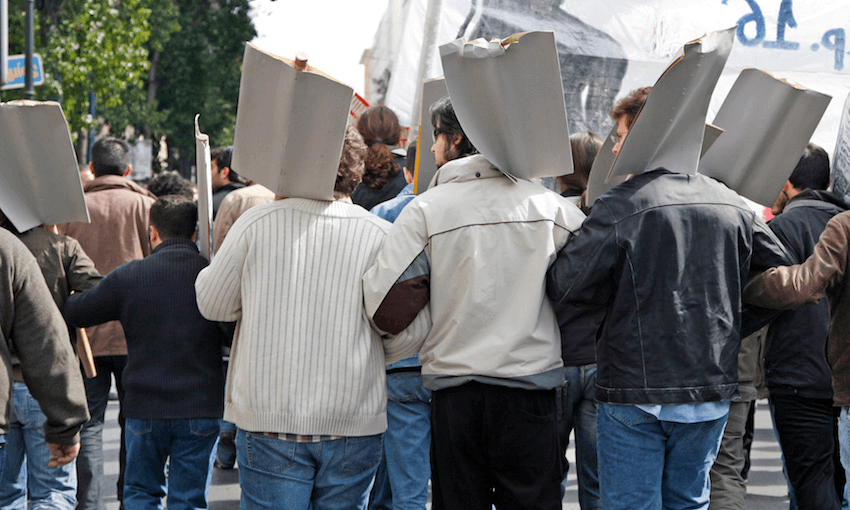It may be a noble ambition, but this is a misguided, misdirected effort, and has the potential to block the path to a healthier planet, writes New Plymouth secondary school student James Macey
On Friday, 15 March, school students around the globe will be going on “strike”. In New Zealand, the “School Strike 4 Climate” (SS4C) will take place in well over a dozen towns and cities, including my own home of New Plymouth. The aim of the event, as its website suggests, is to “tell our politicians to take our futures seriously” by treating climate change as a crisis.
A noble ambition, I must admit, and I have no doubt that the motivation of the demonstration’s organisers is the purest form of genuine. Unfortunately, though, next week’s strike is a misguided, misdirected effort, and has the potential to block the path to a healthier planet.
See also: Why we’re striking
Let’s start with the semantics of it all. By calling the event a “strike”, organisers are giving the impression that the event is some kind of powerful uprising in which students are handing politicians their just desserts. That’s not what this is, though, because the SS4C lacks the fundamental, defining characteristics that any successful strike has.
In the world of labour disputes, strikes work because they deprive an employer of the thing they need to function; workers. That deprivation— a starvation of sorts —is an incredibly powerful negotiation tool. The threat of strikes, and the pandemonium that ensues, are often enough of a shock to employers that disputes can be resolved without workers ever needing to hit the picket lines.
The SS4C does not deprive schools, or the Government, of anything, so cannot really be called a strike. It is merely a demonstration, which, in actuality, commands a mass exodus from school only so that nobody has to head out on a weekend. It is only students who will face deprivation—deprivation of their education and credibility.
It confirms, in the eyes of naysayers, the harmful stereotypes that older generations have of young people; reinforcing the belief that we’re an overly sensitive bunch who’re more than happy to have a moan and a whinge if we don’t get our own way. And at the end of the day, it is politicians who will be heading home successful. Their selfies will, no doubt, be plastered all over the Instagram pages of students who think that, as a result of the walkout, they finally care. “Finally,” we’ll hear, “the Government has been forced to listen.”
Eventually, we’ll find that’s not the case at all.
It’s an unfortunate reality, but it’s one we must accept. The strategy employed by SS4C organisers is one that opens up the door for an unaccountable response by politicians; one that will enable young people to unknowingly succumb to the effects of placebo progress and feel-good press releases. The SS4C is a one-off event, and, while it will emit a spark of publicity, that spark will fizzle out just as quickly as it ignited. The overwhelming majority of media coverage about the demonstration is not about the issues that students want to be addressed.
Rather, it’s about the unprecedented (in New Zealand) defiance that students are showing in walking out of school, and the equally unprecedented support that schools are throwing behind their pupils. Already, the strike’s main message has been washed away by the rising tide, before it has even taken place.
So, what are young people supposed to do instead? Sit back and watch the world burn, like the inconsiderate, lazy, dole-bludging generation that we are often painted as? Of course not. If the necessary progress on climate change is to be had, we must work to open dialogue, rather than a monologue. As young people, we have the keenest interest in protecting our planet’s future.
With that interest comes a valuable opportunity. We are, perhaps, the most environmentally-aware generation of inhabitants that planet Earth has ever welcomed. Instead of relying on those who have come before us for solutions, it is time we looked within. The SS4C’s demand that the Government do something—anything—to meet climate change targets comes across as a fraught and desperate plea for help.
As organisers have said, climate change is going to become our problem. It’s up to us to come up with the solutions. Naturally, that will require the involvement and cooperation of the “power-wielding generation”. But a more unconventional power has been bestowed upon our generation, and that is the power of creativity.
We have the ability to come up with ideas that would never eventuate from a Government working group (or ten). Many of those ideas will be flawed. Some will be downright idiotic. All, however, will come from the perspective of someone whose home’s future depends on success.
That kind of perspective is one that climate change policy needs, and one that will only be heard if young people across the world take some responsibility for our own future. That means finding our own ways to reduce climate change, instead of relying on the Government to do the hard yards.
It means having open and frank discussions in ways that are a little more intellectual than bunking school and heading downtown for a sausage sizzle. True, next Friday’s demonstration is a way of showing that youth believe there’s an issue, but it doesn’t bring anything new to the climate strategy table.
If you’re planning to leave school next Friday to take part in the School Strike for Climate, you obviously care about the future of the planet. My suggestion to you is that instead of wasting your energy on a futile stunt, you channel your enthusiasm into educating your peers, learning more about climate change, and finding new ways for us to make progress towards a healthier planet.
It’s our future. It’s our responsibility, too.





